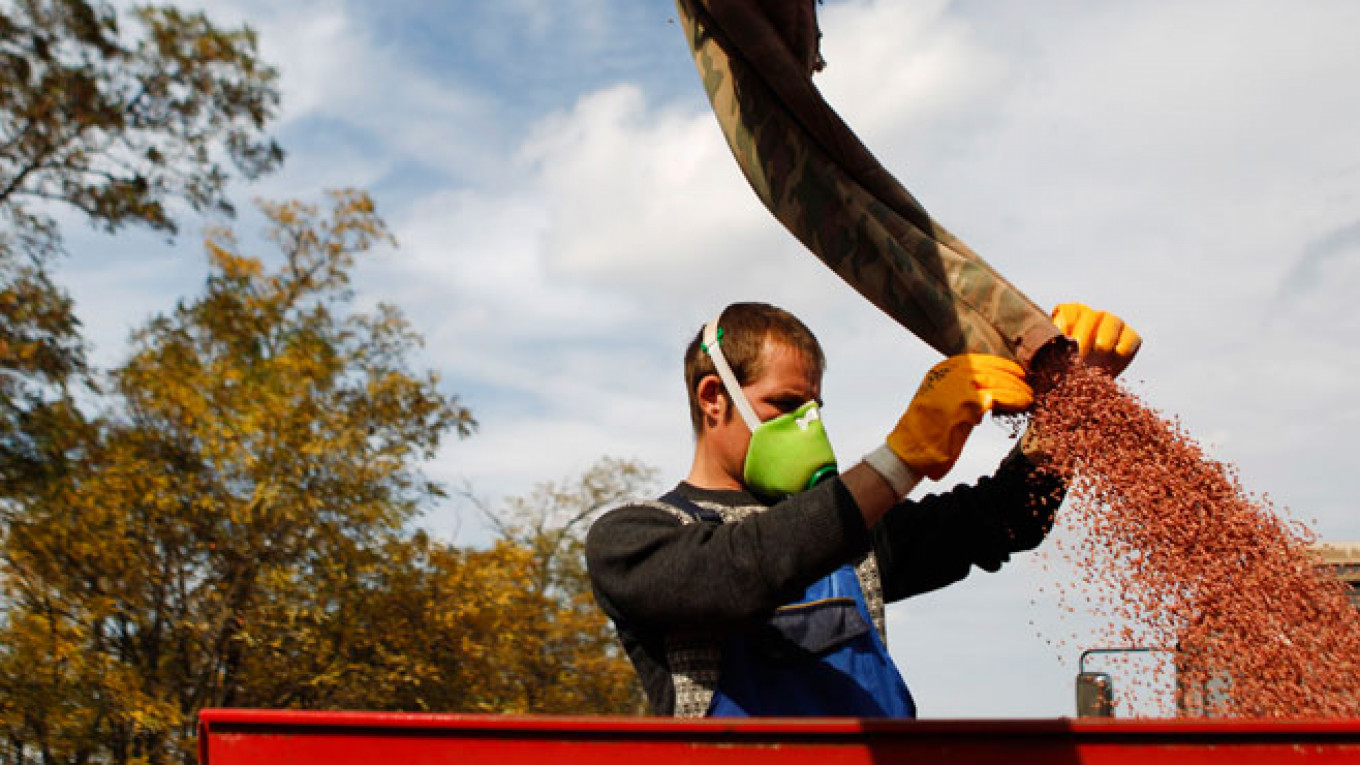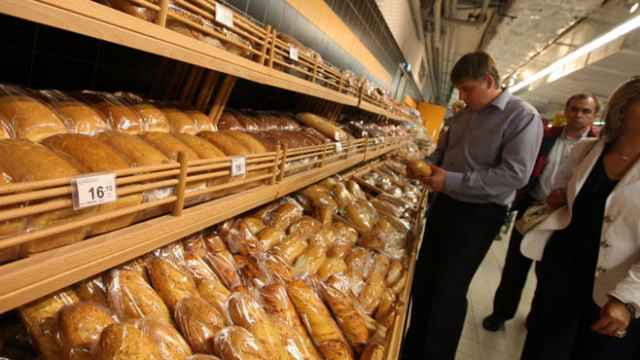Russia's economic turmoil has left small farmers increasingly unable to access financing, casting doubt on the state's ambitious plans to quickly replace food imports with domestic production as relations with the West sour over Ukraine.
Small Russian farmers received 50 percent less loans year-on-year in September, according to a report by consumer credit reporting agency Equifax. Large agricultural producers fared better, but still saw loans fall by 15 percent.
Russian Agriculture in Figures
Agriculture made up 4.2 percent of Russia's $2.1 trillion GDP in 2013, according to the U.S. Central Intelligence Agency's World Factbook, and 5.7 percent of Russia's 2013 exports, according to the World Trade Organization.
Wheat is Russia's top crop by a mile, with over 56 million tons produced in 2011, according to the United Nation's Food and Agriculture Organization. Potatoes came in second with about 33 million tons, followed by plants grown for animal feed at 2.5 million tons.
Russia is one of the world's largest wheat exporters, with most of its deliveries going to North Africa and the Middle East. Russia has exported 22.5 million tons of wheat since July this year, according to data from the United States' Department of Agriculture. This puts Russia right alongside Canada and behind the European Union and United States, which exported 28 million and 25.5 million tons, respectively.
Informal farming by private individuals was worth 1.6 trillion rubles ($34 billion), or 42.6 percent of all Russian agricultural production in 2013. The production of small farms accounted for 9.8 percent and larger commercial producers 47.6 percent, according to data from state statistics service Rosstat.
Russia placed a one-year ban on a range of food imports from the European Union, United States, Australia, Canada and Norway in August. A retaliation against Western sanctions over Russia's involvement in the Ukraine crisis, the move was hailed by Russian politicians as a chance for domestic farmers to increase their market share.
But now, this plan has crashed up against Russia's new economic reality. Development requires capital input, and with sanctions chilling the investment climate, capital is more likely to leave the country than flow into new projects.
Western sanctions have cut major state-owned Russian lenders such as Sberbank, VTB and the Russian Agricultural Bank out of U.S. and EU capital markets, leaving them with massive debts to foreign banks that can no longer be rolled over and an imperative to keep their lending portfolios in check.
Facing harder times, banks are "fighting for tried and true borrowers with stable income," said Oleg Lagutkin, CEO of Equifax — putting farmers, with their often unstable revenues, at a distinct disadvantage.
And making matters worse, more and more farmers are having difficulty paying off existing loans,
Equifax found. The number of agricultural loans with overdue payments has risen from 1.2 percent of loans taken out in 2012 to 2.4 percent of 2013 loans.
Farmers are looking hopefully towards the microfinance industry as banks turn them away, but this sector has also seen a "serious drop" in lending this year, Lagutkin said.
The cost of borrowing has risen across the board this year as the Central Bank hiked its key interest rate from 5.5 percent to 9.5 percent in an effort to control capital flight and subdue rising inflation. This will only make it more difficult for Russian farmers, who have long struggled under high infrastructure costs and lending rates, to justify seeking investment loans in a field where upping production generally takes years.
As conditions harshen, the future of Russian agriculture appears to depend more and more on the state's willingness to commit funds from overtaxed federal and regional budgets. Agriculture Minister Nikolai Fyodorov announced in August that, under a new plan drafted by his ministry for 2015-2020, agriculture would require 1.6 trillion rubles ($35 billion) of state investment to boost output.
Contact the author at [email protected]
A Message from The Moscow Times:
Dear readers,
We are facing unprecedented challenges. Russia's Prosecutor General's Office has designated The Moscow Times as an "undesirable" organization, criminalizing our work and putting our staff at risk of prosecution. This follows our earlier unjust labeling as a "foreign agent."
These actions are direct attempts to silence independent journalism in Russia. The authorities claim our work "discredits the decisions of the Russian leadership." We see things differently: we strive to provide accurate, unbiased reporting on Russia.
We, the journalists of The Moscow Times, refuse to be silenced. But to continue our work, we need your help.
Your support, no matter how small, makes a world of difference. If you can, please support us monthly starting from just $2. It's quick to set up, and every contribution makes a significant impact.
By supporting The Moscow Times, you're defending open, independent journalism in the face of repression. Thank you for standing with us.
Remind me later.






